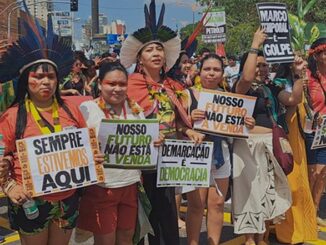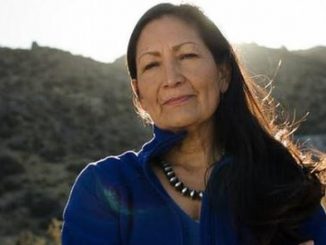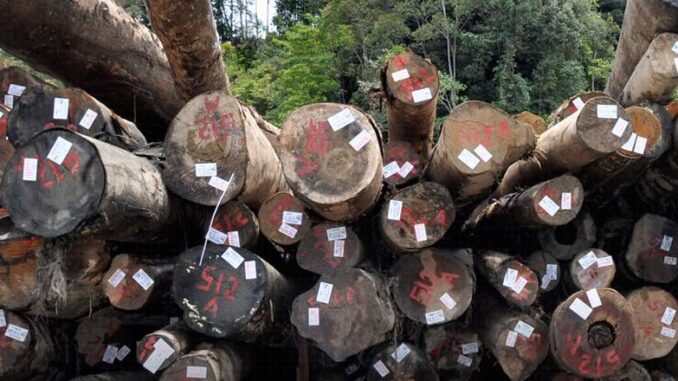
SARAWAK, Malaysia, February 24, 2025 (ENS) – In a victory for Indigenous communities defending their customary lands, the timber company Samling Timber Malaysia has withdrawn several of its timber concessions from the Malaysian Timber Certification Scheme.
This move follows years of resistance from communities across Sarawak, a Malaysian state on the island of Borneo. These communities have long challenged the company’s failure to obtain Free, Prior, and Informed Consent of Sarawak communities and its encroachment into Native Customary Rights lands.
Civil society groups have just discovered that a number of Samling’s forest timber licenses were quietly removed from the list of certified natural forests under the Malaysian Timber Certification Scheme, MTCS.
During a February 13 meeting with village leaders from the Gerenai Forest Management Unit, a Samling representative confirmed the company has abandoned logging in the area due to sustained opposition from communities and non-governmental organizations, as well as financial considerations.
The meeting was organized as part of an inspection of MTCS-certified operations in Malaysia by the Programme for the Endorsement of Forest Certification, PEFC, and representatives of the Dutch Timber Procurement Assessment Committee, TPAC.
Their visit was prompted by repeated reports of certification failures.
Based in Switzerland, the Bruno Manser Fund, BMF, is supporting the Indigenous people of Sarawak, particularly the Penan. The BMF is based on the work of, and named after a Swiss citizen, Bruno Manser, a rainforest campaigner and human-rights activist. From 1984 until 1990, he lived amongst the Penan people in Sarawak, who were then one of the last groups to still be living as nomads in the primeval forest.
Confronted with the rapid destruction of the rainforest by the logging industry, Manser helped the Penan resist the advancing loggers and became the international mouthpiece of the threatened primeval-forest dwellers. Manser has been missing, presumed dead, since his last journey to Sarawak in May 2000.
“Sarawak’s aggressive logging policy has drastically reduced the rainforests. Now, the logging companies and the government are promoting the PEFC timber sustainability label,” the group Manser chaired for years explains on its website.
“For decades, Sarawak has topped the list of regions with the highest timber exports. While the rainforest almost completely covered Sarawak in the 1960s, it now accounts for only 10 percent of the area. Logging roads amount to over 88,000 km, twice the circumference of the earth,” the BMF says.
After the February 13 meeting, local nonprofits arranged for representatives of the two inspecting organizations to meet directly with people from impacted communities on February 15 in Lepo’ Gah Tanjung Tepalit, a village long under threat from logging and a key community in the fight to stop the Baram Dam on the Baram River.
The Baram Dam would require the relocation of 20,000 people – almost all from Indigenous groups. More than 400 square kilometers (154 square miles) of land would be flooded, most of which is traditionally, although not legally, owned by Indigenous communities.
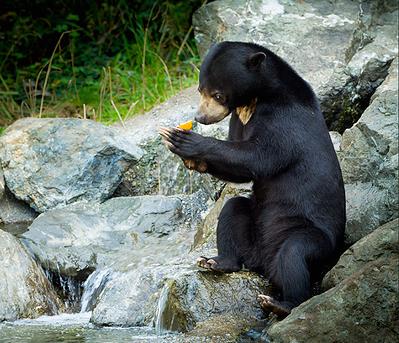
Much of this land is still forested and provides vital habitat for several endangered species.
The Baram area is inhabited by dozens of imperiled species, including critically endangered gibbons, leopards, pangolins, sun bears, and hornbills. The Baram Heritage Survey will track and map the abundance of these animal populations, document the impact of logging, and help build a strategy and management plan.
The full extent of endangered species in the Baram River region is being catalogued and mapped by the Baram Heritage Survey, part of The Borneo Project, funded by the American nonprofit Earth Island Institute.
The Baram Peace Park
“In recent decades, Sarawak has been under intense pressure from the logging, palm oil and mega-hydro companies who seek to exploit the land for short-term financial gain. Up to 80% of the primary forest in Malaysian Borneo has already been degraded. Now, communities in the Baram River Basin are organising to create an indigenous managed protected zone to kick out the companies for good,” according to The Borneo Project.
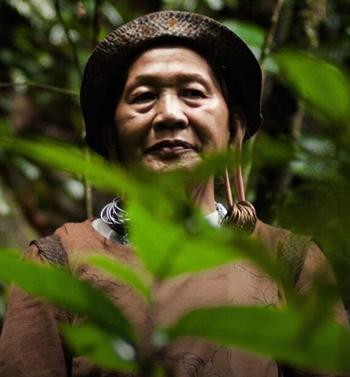
“We are working with these communities on the Baram Heritage Survey to collect comprehensive wildlife, land use and social data for the very first time. This data will be used to help establish the Baram Peace Park, an indigenous vision of forest protection covering the largest unprotected area of primary forest left in Sarawak. The area would cover 2,800 square kilometers and border two national parks to form a crucial wildlife corridor,” The Borneo Project explains.
It was in 2009 that 19 Penan villages conjured up the vision of the Baram Peace Park – under the name of Penan Peace Park back then – with the aim of protecting the forest against logging while also protecting their land rights, the Bruno Manser Fund says.
“While the project originally met with rejection from the government, the situation suddenly changed in 2014 when Sarawak’s then head of government, Adenan Satem, surprised everyone by expressing his clear support for the protection of the forest and giving his backing to the idea of the park. Today, not only the Penan but also Kenyah, Saban and Kelabit villages form part of the park, which is aiming to cover an overall area of 2,800 square kilometers (1,081 square miles),” the BMF recounts.
The Baram Heritage Survey is not an ordinary scientific study. Instead of sending in graduate students, The Borneo Project has hired indigenous village-based field technicians to collect the data, because, researchers say, “They know the context, they know the language, they know what every sign and sound they come across means. They have what no university can teach: intergenerational ecological knowledge.”
It will be the communities who undertake this field work themselves, decide collectively how the data is shared, and use this information to strengthen their land rights claims. This is because the forests of the Baram don’t just contain magnificent endangered wildlife. They are home to indigenous communities who are equally threatened with cultural extinction if the land is lost to destructive industries.
“The communities we work with rely on the forests for clean water, housing, food, and for their livelihoods. For the indigenous peoples of Sarawak, conservation and cultural survival are one and the same,” The Borneo Project says.
Baram Dam Power Not Needed in Sarawak
Approximately 70 community members attended the February 13 meeting from throughout the Baram region.
They know that Sarawak doesn’t even need the power that will be generated from these additional dams and no purchasers for the power have been identified yet.
“We really hope this meeting will finally bring about positive change. I wanted to be here to show that whether certified or not certified, communities here have all suffered from logging activities,” commented one community member who had travelled from the remote Penan village of Ba Data Bila to attend.
Penan leader Komeok Joe, executive director of Keruan Organisation, repeats the Penan communities’ call for a permanent withdrawal of Malaysian Timber Certification Council certification and logging concessions, especially the Ravenscourt Forest Management Unit, saying, “They have suffered enough from logging and lack of FPIC [free, prior, and informed consent] in the past!”
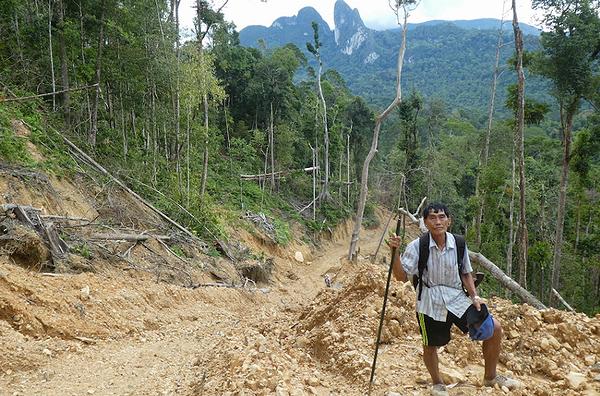
For years, Indigenous communities and civil society partners have exposed serious flaws in Malaysia’s timber certification process, citing inadequate consultations, disregard for customary land rights, and lack of transparency in the implementation of forest management standards.
Commenting on the community meeting, Celine Lim, managing director of SAVE Rivers, which empowers Indigenous people to protect their lands, rivers, and watersheds, said, “The crowd that gathered here today are eager to voice their grievances over systems that rob them of their Indigenous territories. They are jubilant that Samling withdrew their forests and from the logging certification system. What communities now want is a full recognition of their territories, and to stop having to perpetually deal with outsiders that claim to have operational rights.”
Originally established in 2011 to organize communities of Baram against the proposed Baram Dam, SAVE Rivers had a victory in 2016 with the official cancellation of the dam.
When asked what will happen to the land now, a representative from the Sarawak Forest Department said that the government has mechanisms to determine land use. Communities and NGOs are calling on the Sarawak government to return the land to Indigenous communities, uphold Indigenous rights, and prevent other companies from entering Indigenous territories without the full consent of communities.
Uding, a Kenyah-speaking resident of Lepo’ Gah Tanjung Tepalit, told SAVE Rivers after the session, “If only I were able to speak in Malay, I would go and tell them we just do not want any logging activities in our forests any more. We just want it to stop.”
Featured image: Timber cut from Indigenous customary lands in the Malaysian state of Sarawak on the island of Borneo. undated (Photo courtesy Bruno Manser Fund)
© 2025, Environment News Service. All rights reserved. Content may be quoted only with proper attribution and a direct link to the original article. Full reproduction is prohibited.


